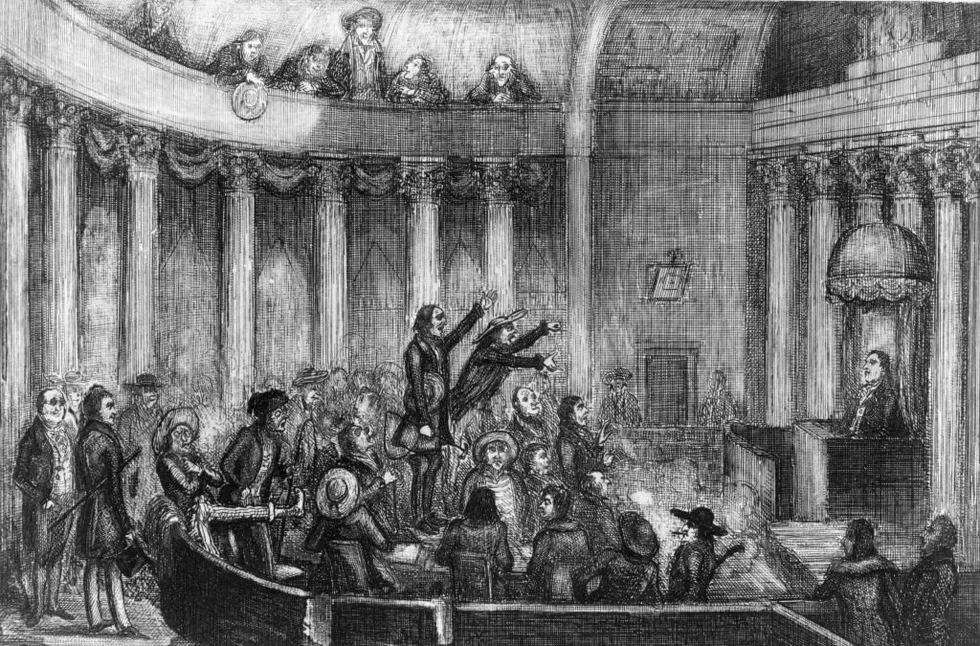Senate Democrats revive an old antebellum tactic to protect Mayorkas

The Senate’s Democratic majority made quick work last week of Secretary of Homeland Security Alejandro Mayorkas’ impeachment trial. After several procedural votes, both articles of impeachment were voted down on mostly party lines. And just like that, the people’s check on executive power was silenced.
Republicans in the House charged Mayorkas with two articles of impeachment, alleging he “willfully and systemically refused to comply with Federal immigration laws” and “knowingly made false statements and knowingly obstructed lawful oversight of the Department of Homeland Security.”
By gagging the opposition, Chuck Schumer and his colleagues have aligned themselves with the disgraced Democrats of the antebellum period.
House Republicans acted well within the Constitution’s strictures. Article II, Section 3 of the Constitution instructs the executive branch to “take care that the laws be faithfully executed.” Should the executive department ignore or obstruct the law, Article I, Section 2 gives the House “the sole power of impeachment,” namely, the ability to charge officials who disregard the law, the Constitution, and will of the people.
Article I, Section 3 gives senators “the sole power to try all impeachments.” The House levels the charges, and the Senate holds the trial to decide whether the official misconduct is serious enough for a conviction and removal.
The House is supposed to represent the people’s interests. In our present partisan era, however, the House represents the Republican Party. The Senate represents the states’ interests. In reality, however, it represents the Democratic Party today.
Regardless of party, the American people are largely disappointed in the Biden administration’s immigration policy. Speaking through the House, the people have challenged that policy to no avail. The lack of honest dialogue between the administration and the House led to the impeachment of Mayorkas.
Dividing the responsibility of impeachment between the House and Senate requires honest communication, too. When one party silences the other, that is a sign of deep dysfunction.
Democrats have silenced their opponents before
During the antebellum period, the Union was tested. The relationship between the states and the people of the states was divided into parties: the slaveholders and the non-slaveholders. The slaveholding faction concentrated its power into the newly formed Democratic Party.
The non-slaveholders continuously petitioned the House to debate slavery. Rep. James Henry Hammond proposed the idea of a rule to silence debate on the issue. Speaker of the House and future President James K. Polk placed the issue into a committee led by South Carolina Rep. Henry L. Pinckney. The result was the passage of the 21st rule, later known as the “gag rule,” which tabled or postponed consideration of all petitions related to slavery with no discussion.
During the antebellum period, the slaveholders’ interests won out. Their interest in slavery wasn’t merely economic. It was about power. The three-fifths compromise gave slaveholders additional power in Congress. Fearful of debate, they used their extra power to extend their interests and silence dissent. The broken communication between the different interests of the Union and the brazen grasp for power by one party eventually led to the Civil War.
A constitutional amendment did away with the three-fifths rule following the Civil War. Power was balanced in Congress between the states and the people. But as the nation grew during the Gilded Age and immigration caused the population to swell, a new source of power became the interest of the parties, and a new divide began to form.
European immigrants came to America in search of a new and better life. The rise of industry required large manufacturing plants and the need for labor. This was a perfect match. As immigrants would concentrate in cities, however, it tilted the representative power in the House. Instead of a divide between North and South, slaveholding and nonslaveholding, the divide was between urban and rural areas, large corporations, and small industries.
A modern gag rule?
The debate over immigration has lasted for generations and has produced few solutions. The Constitution requires the Census to count all persons for apportionment purposes. Trouble is, that incentivizes illegal immigrants to secure representative power. The pro-illegal immigration lobby has concentrated in the Democratic Party, and the anti-illegal immigration interests are represented (more or less) by the Republicans.
Antebellum Democrats repeatedly used federal power to expand and protect the power and interests of slaveholders. Similarly, the modern Democratic Party, abetted by the likes of Alejandro Mayorkas, has allowed an explosion of illegal immigration, which increases the representative power of those in sanctuary cities.
And so much like the antebellum Democrats, the modern Democrats silenced debate, saying the articles of impeachment against Mayorkas were “unconstitutional.”
Regardless of where one falls in the debate on immigration or the interests of the parties, Congress has a constitutional responsibility to check the executive branch’s power and ensure the people’s law is executed faithfully. By gagging the opposition, Senate Majority Chuck Schumer (D-N.Y.) and his colleagues have aligned themselves with the disgraced Democrats of the antebellum period, placing the interests of their party above the interests of the states and the people.










